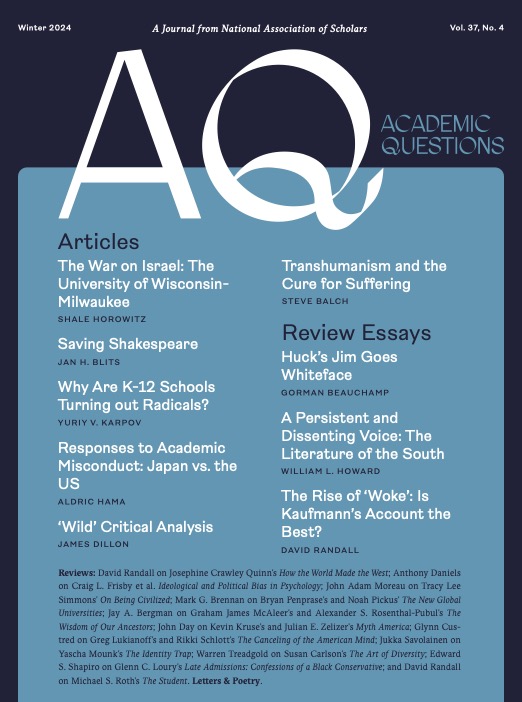How the World Made the West: A 4,000 Year History, Josephine Crawley Quinn, Random House Publishing Group, 2024, pp. xv + 592, $29.99 hardcover.
Josephine Crawley Quinn has written a poor popular history of Western civilization. Western civilization, says the Professor of Ancient History at Oxford, doesn’t actually exist. Also it’s evil and only bad people are for it. We are not part of anything so coherent as a civilization, says Quinn, but rather defined by those with whom we interact.
Quinn’s thesis more largely: In the nineteenth and twentieth centuries, European and American thinkers popularized a pluralizing conception of civilization, which described the essential continuity and characteristics of different civilizations, conceived of as contrasting and distinct entities. Western civilization was defined as superior, taken on dubious historical grounds to unify ancient Greece and Rome primarily with modern Western Europe and America, and acquired a dubious racial connotation. (4-11) This civilizational thinking should be opposed because it’s inaccurate. Focusing too much on Greece and Rome (says the Carthage specialist) teaches a narrow view of our past.
Civilizational thinking also obscures commonalities between civilizations and internal differences within them. What matters fundamentally is historical connections: “Distinctive local cultures come and go, but they are created and sustained by interaction.” (4-5, 12, 62) Western civilization never has existed: “there has never been a single, pure Western or European culture.” (13) Also, contemporary champions of Western civilization are a benighted lot; “German Nazis … [who] used reports of the Spartan education system as a model for the Hitler Youth”; and ‘neo-fascist activists,’ such as the January 6 “rioters [who] wore replica Spartan helmets to evoke the idea of resistance to totalitarianism.” (11, 211)
Thence follows the meat of Quinn’s book, four hundred-odd pages of episodes and aspects of Western civilization from Sumer to the medieval West, cherry-picked to prove there’s no such thing as Western civilization, and that every generation of Western civilization is vile and trivial. Animus alone unites her hodge-podge narrative.
Quinn’s argument and narrative, of course, is largely nonsense and largely unoriginal. Where it is true—that Greece and Israel were indebted to Mesopotamia, Egypt, and Phoenicia, that civilizations are not hermetically sealed bottles—she attacks straw men. No defender of the conception of Western civilization denies that Western civilization is e pluribus unum, motley within and welcoming of the best of the world without. Quinn’s book matters more because she is the voice of the new establishment, her account of Western civilization as a devil simultaneously non-existent, trivial, evil, and to be exorcised at all costs is a catechism already force-fed to our children. She should be disputed because she articulates the new establishment’s party line on Western civilization, because her book has gotten undeservedly respectful reviews in The Guardian, The Economist, The Telegraph, The Financial Times, and The Wall Street Journal, by reviewers who take her claims to originality and accuracy too much at face value—and because what she says just isn’t so.
Consider Quinn’s muddled definition of civilization. Quinn’s polemic against civilizational thinking blurs the target of her attack. She discusses pottery a great deal, sometimes culture, rarely intellectual ideals, and she proceeds as though the distribution of amphorae proves a point about the extent or the existence of Western civilization. First one must stipulate some tight relationship between ceramics and civilization that allows one to serve as a proxy for the other—and Quinn does not. She seems rather to assume that disproving evidence for any one definition of civilization will disprove them all—that to establish the existence of long-distance trade in pots says something important about civilizational character. Because Quinn fails to define the civilization she seeks to debunk, much of her book is a non sequitur.
Quinn scants the case that Western civilization might share elements with neighboring civilizations and still be distinctive. Assur may well have been “run by a council of elders and a broader voting assembly that operated as the ultimate political authority in the state.” (38-39) The argument for Greek distinctiveness is not that they were the only people in the vicinity of Sennacherib and Cyrus ever to develop some institutions of self-government, but that they were the only people to preserve them. Quinn symptomatically provides five pages of parallels between The Epic of Gilgamesh and The Iliad, but only casually mentions, “The actual plots of Gilgamesh and the Iliad are completely different.” (174-79) The case for Greek civilizational distinctiveness rests on how Greece’s poets shaped their literary materials, not that they shared a quarry with their Mesopotamian peers.
This case for Western civilizational distinctiveness, of course, is one of intellectual history—and Quinn severely shortchanges intellectual history, above all religious history. The argument that there is a distinctive Jewish civilization, or a Western civilization drawing upon it by way of the New Testament, rests centrally upon an analysis of the substance of the Bible, and of Jewish and Christian religious belief and practice, and a comparison of that substance with the substance of the beliefs of rival religions. So too the argument for a distinctive Greek civilization, equally influential upon Western civilization, rests on an analysis of the substance of Greek thought, in Homer, in Plato and Aristotle, in Isocrates and Demosthenes, in Aristophanes, Sophocles, and Euripides, and in the laws and mores of millions of Greeks, in many centuries, in their cities and their empires. Quinn scarcely bothers to mention such arguments even to dismiss them, much less to disprove them. Quinn believes she has disproved the existence of Western civilization while scarcely considering the core of what is supposed to be Western Civilization—some combination of enduring ideals, writings, customs, and peoples, articulated as a continuous, conscious, and significantly (but not exclusively) inbred conversation of the past and the present.
Quinn centrally supports her thesis that interactions matter more than civilizations by cherry-picking history to emphasize the global and the commercial at the expense of the rooted and the agricultural. She barely mentions agricultural history, the history of peasants, the rooted bulk of humanity since the field began to supplant the forest. Her scattered half-acknowledgments of the importance of agriculture deserve far more weight: “in the Hebrew Bible Cain and Abel were the first shepherd and farmer, and Noah the first vintner.” (182) When Quinn writes of Crete, she notes, without conveying the significance, that “palaces counted the wheat, wool, and oil owed to them, and controlled the service and labor they required.… writing works best for those in power, who want to take censuses, collect taxes, and impose law.” (105) Palaces, writing, law—these are meant to exert control over a peasantry on the land.
Neither does Quinn address the relationship of the history of agriculture to the broader history of Greece and Rome politics. Victor Davis Hanson’s Warfare and Agriculture in Classical Greece (1983) emphasizes the role of the small Greek farmer, and indeed the particular nature of the olive tree, in the formation of Greek hoplites, Greek military tactics, democracy, and, by extension, the entire spirit of the West. Quinn mentions none of this. So too, she never mentions Tiberius Gracchus and his desire for land redistribution—or any other aspect of Roman landowning structure that bears upon Rome’s political or intellectual history, or its legacy to the medieval West. Neither does Quinn underscore that “The Romans kept back [from destruction] one work by the agricultural writer Mago, to be translated into Latin” (263). The Carthaginians practiced agriculture too—and the Romans evidently valued a work on agriculture more than anything else written by the Carthaginians. Quinn’s argument that we are more connections than civilizations cannot stand once you realize how she has cherry-picked and distorted to ignore the extensive historical evidence for the importance and the endurance of peasants and peasant society—the ballast of civilization.
Quinn preaches, The West doesn’t exist and therefore there is no point in knowing about it. Her book will provide self-confident midwits shallow misinformation with which to think they have refuted civilizational beliefs. Thereby she contributes to the progressives’ all-too-successful campaign to murder Western civilization. If we forget the Bible and Homer as our forebears forgot the Epic of Gilgamesh, if that amnesia extends to the Constitution and every ideal of liberty, then the West is dead. If our descendants resurrect the texts in two thousand years, it will be for a different civilization from ours.
The defenders of Western Civilization must resist the Quinns of the world who seek to induce amnesia of the West. Their job in this case is easier because Quinn takes a bad case and makes it badly. Space limitations preclude a full catalogue of her errors and of her snarky vilification of the West. Quinn cannot persuade anyone with even a casual knowledge of Western history.
That number, alas, is too small. But vigorous lucid, and accurate exposition of that knowledge should suffice to immunize our children from Quinn’s malarkey.
David Randall is director of research at the National Association of Scholars, 13 W. 36th St., 4th Floor, New York, NY 10018; [email protected]. His most recent books are The Concept of Conversation: From Cicero’s Sermo to the Grand Siècle’s Conversation (2018) and The Conversational Enlightenment: The Reconception of Rhetoric in Eighteenth-Century Thought (2019). Randall’s “All is Ok With the Universities,” a review of Michael S. Roth’s The Student: A Short History (2023) appears in this issue of AQ (Winter 2024).














